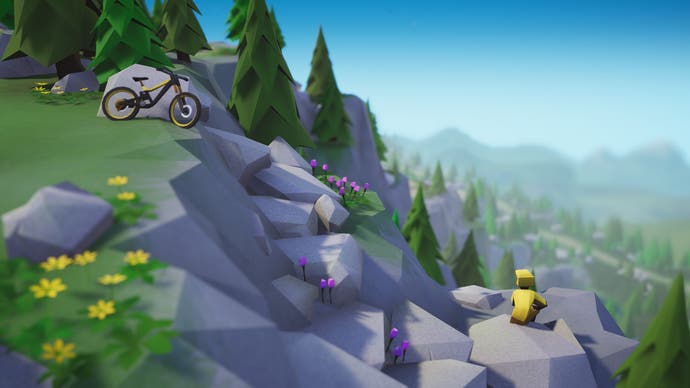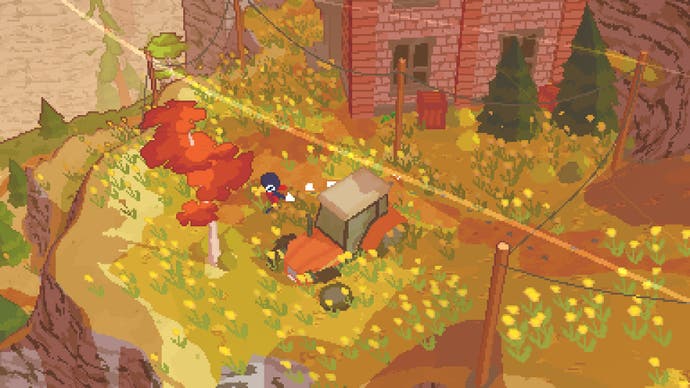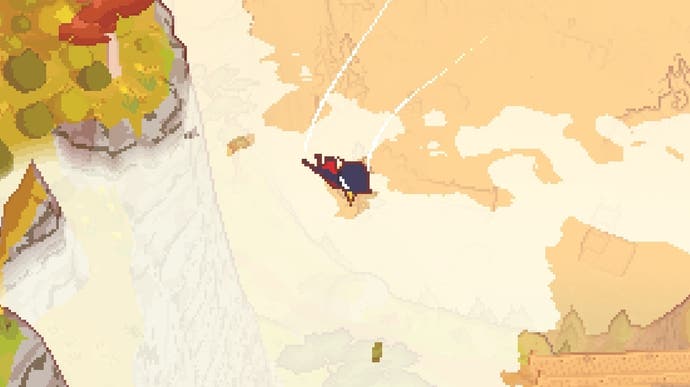Up Close: the supreme realism of Lonely Mountains: Downhill and A Short Hike
Human nature.
Up Close is a new, occasional and informal series here on Eurogamer, looking at the smaller points in games in greater amounts of depth. Covering anything from a single mechanic to a reoccurring theme, in praise or criticism, the aim is simply to look a little closer at the things that deserve our attention.
Increasingly, games are looking to the environment to tell their stories. It's easy enough to see why. On one side the natural world is moving closer and closer to the centre of our thought, as the climate crisis becomes more urgent and less easy to ignore. On the other, it becomes a great device for telling a story of impending, existential disaster - or indeed one of the hope to be found in the aftermath. And, above all, pretty environments sell.
But alongside the rise of environmentally aware games is a little micro-surge of environmentally conscious ones. Which is to say, games that are less about the environment as they are about that way you think about it, the connection that forms between your mind and the world around you. Metaphysics, basically, or mindfulness, if we want to narrow it down further. In particular I'm thinking of a couple of mindfulness games from the end of last year, Lonely Mountains: Downhill and A Short Hike, which both look to use the natural world to turn your own gaze inwards, and both happen to use mountains - specifically going either up a mountain or down one, although there aren't many other things to do with mountains in fairness - to achieve the kind of effect I think they're after.

If you haven't played these two - and you really should - their magic is in the way they spark a kind of heightened awareness of the world you're playing in, the joy of these games being the joy of being in nature itself. In Lonely Mountains it's through kinesis, the actual movements you make and the momentum you feel from them as you go. The world is silent and pristine, only punctured by the whirring of your bicycle's spokes or chirping birds and the occasional plop! of water. The invitation is there for you to feel your way through a course, more than to plan it, and in doing so it gets closer to the reality of a downhill sport than many other, more explicitly realist games have before it. The magic of going downhill is the sensation - the fear, the reaction to and control of kinetic energy, the proximity to actual death and how that triggers a heightened awareness of life - and so Lonely Mountains touches on a kind of reality games rarely seem to access.
A Short Hike is different but the same. The little rest spots that dot Lonely Mountains' mountains as sideways nods to a moment of mindfulness are instead the single end goal in A Short Hike, as you make the not-very-short-at-all hike up a mountain to the oasis of Hawk Peak. Where Lonely Mountains' mindfulness is a byproduct, A Short Hike makes it the explicit end in itself. The goal is to enjoy your journey, and in doing so reach a better sense of your connection to the natural world. Successfully reaching Hawk Peak is successfully awakening to the world around you, successfully reconnecting your mind to reality.

What these games really are, in fact, is Zen. Zen Buddhism gets a bad rap because it's easily manipulated into the more vague notion of wellness, itself an industry that's become more than a little sickly and vastly over commodified, and so Zen comes to mean "chill" and eastern philosophies like it quickly become entangled in the vacuousity of mysticism. But stick with it, because the practise of Zen is really about perceiving nature as it truly is, unaltered by logic or reason or rationalisation, which is a bigger and more pertinent problem than might be immediately clear. For starters, on the heavy-reading philosophical side, a great many bright minds have struggled to prove we can experience anything of the "real" world at all. David Hume pointed out the problem as well as anyone else when he gave his famous example of how we perceive a table:
"The table which we see seems to diminish as we remove farther from it. But the real table, which exists independent of us, suffers no alteration. It was, therefore, nothing but its image which was present to the mind."
The point is, there's a good argument to say that we never really get direct experience of the natural external world as it is. All we get is "sense data", an intermediary image of whatever the real thing actually is, that may be nothing like it. You and I might even see two different colours when we look at the table's wooden legs, even if we both call the colour we're seeing brown, and neither of us can know if what we're seeing as brown is the colour the table's legs actually are.
On the more practical side of it, proximity to nature - or to reality, however we want to define it - feels as pertinent a problem now as it ever could be. The cliché is a millennial glued to their phone, but like a lot of clichés there's some truth behind it, as the pace of life picks up, attention is spread thinner, and connections between people shift more and more to the virtual - even before our recent change in circumstances. There's a reason behind the surge in demand for mindfulness apps like Headspace, and behind the nagging, guilty sensation, if you're anything like me, that your daily constitutionals in the local park or tree-lined suburban lanes are granting a greater sense of peace than you're used to. With the addition of time and attention, suddenly I'm finding grass is smelling a little more like grass, birds sounding more like birds, mud feeling more like mud.
Games like Lonely Mountains and A Short Hike's overt Zenness means they go beyond just being about nature to being about what it is to experience nature. They become about the nature of experience itself, and your proximity to the natural world that's thrust upon you by a mountain hike or mountain descent gives you a sense of proximity to reality, as a result, that is if anything greater than the sense of reality that's to be had from photorealism or more literal simulation. One Zen poem, after all, arguably solves Hume's problem by turning it inside out:
The old pond
A frog jumps in
The sound of water
One going interpretation is that "the sound of water" - purposely translated this way instead of "plop!" - is representative of silence being disturbed. The sound isn't mimicked because the reader is being encouraged to imagine it, to hear it for themselves, and so in reading the poem you are, the theory goes, getting closer to the experience of a frog jumping into water than if someone recreated the actual sound. The purpose of the poem becomes an invitation to imagine nature, and in imagining nature, you're getting closer to a pure experience of it. In other words, reality is simply the sensation itself, and there's no obstacle in between, like Hume worried, because the sensation is all there is.
Maybe, going by that, Lonely Mountains and A Short Hike's impressionist version of nature are like the poem of the frog jumping into the pond: built on the sensations and state of mind nature evokes, while the bigger, richer games are still trying to achieve reality by imitating it. And maybe in that sense, Lonely Mountains: Downhill and A Short Hike are the closest to reality games can ever hope to get.


